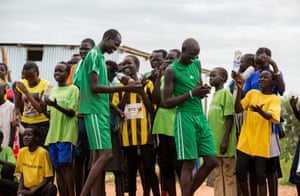In September 1991, Moldavia was hit by floods that killed hundreds of people. I was general manager of the German football club Werder Bremen at the time, and we were about to travel to Romania for a European Cup match against Bacău. On learning of the disaster, we decided to charter a truck with relief and medical supplies. Football helped to bring a glimmer of hope to the people affected by the flooding.
Not for the first time in my life, I was struck by the thought that sport is the most unifying and inspiring development and peace tool in the world. No other social activity brings people together in such great numbers, and with so much passion and enjoyment. This conviction has since been reinforced by the work I have done around the world as special adviser to the UN secretary general on sport for development and peace.
Regardless of age, gender or ethnicity, sport is enjoyed by all; its reach is unrivalled. More importantly, though, sport promotes universal values that transcend language and culture. I saw this at first hand during a visit to Rwanda in 2011, when I attended the Four Countries 4 Peace football tournament, an initiative to promote reconciliation and dialogue between young people from Burundi, the Democratic Republic of the Congo, Rwanda and Uganda. Each team had an equal number of boys and girls, but only the girls were allowed to score goals. In the absence of a referee, the players were responsible for resolving any disagreements. By playing together, these young people were unwittingly learning the universal values of respect, tolerance and fair play. It was a victory for sport.
Moments like these show that sport has huge potential to effect social change. Sport and physical activity improve individual health and wellbeing, both physically and mentally, and teach important values and social skills. But sport doesn’t just empower on an individual basis; it also unites and inspires people collectively, which builds communities.
In many countries, however, opportunities to participate in sport are limited by significant infrastructural, social and political barriers. For example, people with disabilities are marginalised in many societies, preventing their involvement in sport. Given the personal and social development benefits sport offers, increasing access and participation is a development goal.
For this reason, the UN office on sport for development and peace has been running a youth leadership programme since 2012, with the aim of empowering young leaders from disadvantaged communities to use sport as a tool for progress. The initiative has enjoyed some notable successes. In 2014, a young Paralympic athlete, Maclean Dzidzienyo, from Ghana, participated in the Berlin YLP camp. He has since reached the B-standard qualifying time for the Paralympics. He is working towards qualification for the Paralympics in Rio de Janeiro in September.
In August 2013, the UN general assembly adopted a resolution establishing 6 April as the International Day of Sport for Development and Peace. The day offers a natural focal point for the movement, which was buoyed by sport’s recognition in the sustainable development agenda adopted by the UN last year. The day encourages people to participate in sport, and aims to raise awareness about sport’s potential as a development tool, and promote grassroots projects and organisations.
This year, a campaign has been launched encouraging people and organisations involved in sport for development and peace to share a picture or video on social media, highlighting the sustainable development goal to which they are contributing. The campaign, Let’s play for the sustainable development goals, has enjoyed heartening support from partners and participants alike.

On 6 April I will be in Nepal for the inauguration of the Table Tennis For NepALL project, which aims to promote the inclusion of people with disabilities. It is a great example of how sport can foster social development, by changing perceptions about people with disabilities as well as providing them with an opportunity to participate in sport despite significant barriers. In particular, after the devastating earthquake in Nepal last year, sport can give a sense of normalcy and self-efficacy for the many survivors.
Our international day has grown every year, strengthening the network of organisations and people using sport for development. I am immensely proud that this year we are celebrating the third international day. It has served well as an awareness-raising and network-building tool, with the number of internet users reached on Twitter and Facebook increasing from 5.5 million people in 2014 to 7 million in 2015.
It is now important for this reach to be transferred into action. Partnerships – between governments, NGOs, sports federations – need to be strengthened, with further projects implemented on the ground. The forthcoming Rio Olympics highlight how sport can bring the world together, exemplified by the Olympic truce adopted by the UN.



